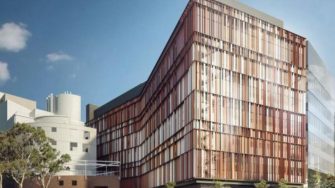Graduate Certificate in Property and Development
- Commencing Terms
- Term 1 & 3
- Duration
- 0.7 Year(s)
- Delivery Mode
- Face-to-face (includes blended), Online
- Campus
-
Kensington
- Codes
- Program code 7127
- CRICOS code -
-
2026 Indicative first year full fee
- $19,500*
-
2026 Indicative full fee to complete degree
- $19,500*
-
2026 Indicative first year full fee
- $24,500*
-
2026 Indicative full fee to complete degree
- $25,000*

- Overview
- Entry requirements
- What will I study?
- Future careers
- How to apply
- Fees & Scholarships
Overview
The Graduate Certificate in Property and Development at UNSW is the first tier of two postgraduate programs in Property and Development that will prepare you to advance your professional experience and drive solutions to current and future challenges in property development.
The program is completed on a part-time basis over one-year, so is both a practical way for you to upskill over a year while working, and to gain credit points as a stepping-stone to the Master of Property and Development.
As part of the School of Built Environment, you will join a community of students and experts in architecture, design, construction and planning - mirroring real industry relationships with stakeholders. You’ll learn contemporary property and development principles, and apply these to achieve successful outcomes in time, cost, quality, safety, and sustainability, gaining the skills to drive property solutions with a positive impact for people and the planet.
Key features
The key features and subject areas in your coursework will see you explore theory and practice, preparing you for the careers of the future in property development and management. These include:
- Property performance analysis
- Property valuation
- Property investment and Finance
- Property industry application
- Property development and feasibility analysis
- Real property law
- Asset and facilities management
Why study at UNSW?
- Learn from academic expertise and practitioners, and collaborate with peak industry bodies
- Progression pathway into the Master of Property and Development
- Study a dynamic program to prepare for industry futures
- Establish networks through our strong industry links and partnerships
- Study at a Built Environment school ranked #1 in Sydney and #23 globally for architecture & built environment (QS World University Rankings by Subject, 2025)
- Prioritise career success - UNSW has been awarded Most Employable students for seven years in a row (Australian Financial Review (AFR) Top100 Future Leaders Awards, 2020–2026)
- Gain interdisciplinary connections through UNSW Arts, Design & Architecture
- Access world-class alumni connections
- Join a global top 20 university (QS World University Rankings, 2024–2026)
- Join a community that’s part of the prestigious Group of Eight (Go8) universities
Want to see more from UNSW Arts, Design & Architecture?
Entry requirements
To qualify for entry to the Graduate Certificate in Property and Development, you will need to have one of the following:
- A bachelor degree in a related field*
- A recognised college or university diploma in a related field*, plus a minimum of three years relevant work experience in the property industry at a management level.
- A recognised bachelor degree or college or university diploma in an unrelated field, plus a minimum of five years of relevant work experience in the property industry at a management level.
- A recognised and relevant professional qualification in a related field*, plus 5 years of relevant work experience in the property industry at a management level. Professional qualifications include membership of the:
*Related fields are:
- Built environment disciplines
- Engineering
- Business
- Law
- Building
- Construction management
- Construction economics
- Urban planning
- Quantity surveying
- Property development
- Real estate
- Property and facilities management
- Building surveying
Please note: The Graduate Certificate is not available to international students as it can only be undertaken on a part-time basis.
English language requirements
You may be asked to provide evidence of your English proficiency to study at UNSW depending on your educational background and citizenship. English language skills are vitally important for coping with lectures, tutorials, assignments and examinations - this is why UNSW requires a minimum English language competency for enrolment.
If you’re completing an Australian Year 12 qualification (e.g. NSW HSC or equivalent), you do not need to provide anything extra to prove your proficiency. Your qualification will be used as evidence of your English proficiency.
If you do need to provide evidence of your English proficiency, this will be indicated in your application. You can prove this by providing evidence that you meet one or more of the following criteria:
- English language tests and university English courses
- Prior study in the medium of English
- Other qualifications
If you need to improve your English skills before you start your degree, UNSW College’s Academic English Programs are for you. The programs are suitable for various English levels and help you prepare for university studies and life in Australia.
For more details, visit the English Language Requirements page.
What will I study?
UNSW is introducing a new academic calendar from 2028.
We are moving to a new flex-semester calendar. What does this mean for your studies?
Program structure
The Graduate Certificate in Property and Development consists of four courses taught part-time over one year, with a total of 24 units of credit (UOC)
Once you complete these courses, you will be eligible to gain Recognition of Prior Learning (RPL) and progress into the Master of Property and Development. The Master's will deepen your knowledge, industry experience and research skills, giving you professional accreditation and further opportunity to advance your career.
Full program structure
Each university year at UNSW has three terms and an optional summer study period. This program consists of four courses and can only be undertaken on a part-time basis during the three terms.
Depending on how you plan your study load, you will study one or two courses in each term, and complete the Certificate in one year.
You will choose to study four of the following disciplinary core courses offered in the three terms (not in the summer term):
- Property Performance Analysis
- Property Investment and Finance
- Property Valuation
- Property Development and Feasibility Analysis
- Property Industry Application
- Real Property Law
- Asset and Facilities Management
For further information on the course listings, descriptions and timetables please see the UNSW Online Handbook.
Future careers
Each year Australia commits more than half of its capital outlay to land development, building and infrastructure.
Through the Graduate Certificate, you’ll gain in-demand knowledge and skills that will open up new career opportunities in property development and management or a related industry and lay the foundations for career progression. You’ll also be able to progress into the professionally accredited Master of Property and Development or Master of Construction Project Management.
Potential careers
- Property development
- Property investment
- Property and facilities management
- Real estate
How to apply
Applications must be submitted through our Apply Online portal. We encourage you to submit your completed application as early as possible to ensure it will be processed in time for your preferred term. Some high-demand programs and Faculties with limited places may have an earlier application deadline or commencement date. Find out more.
Ready to start your application?
N/A
Ready to start your application?
Fees & Scholarships
*Fees are subject to annual review (or when required) by the University and may vary accordingly.
Indicative fees are a guide only and have been calculated based on the typical enrolment patterns of students undertaking the program. The indicative fees listed here is an estimate for tuition only and excludes non-tuition fees and charges. The amount you pay will vary depending on the calendar year of enrolment, the courses you select and whether your study load is more or less than 1 Equivalent Full Time Student Load (48 units of credit (UOC) per year).
You should not rely on indicative fees as fee increases are assessed when required and may exceed the indicative figures listed here. Actual fees are calculated on enrolment. More information on fees can be found at the UNSW fees website.
*Fees are subject to annual review by the University and may increase annually, with the new fees effective from the start of each calendar year. The indicative fees listed here are based on an estimated average and are for tuition only, other fees and charges are not included. The amount you pay will vary depending on the calendar year to enrol, the courses you select and whether your study load is more or less than 1 Equivalent Full Time Student Load (8 courses per year).
Indicative fees are a guide for comparison only based on current conditions and available data. You should not rely on indicative fees. More information on fees can be found at the UNSW fees website.
Indicative fees to complete the program have been calculated based on a percentage increase for every year of the program. Fee increases are assessed annually and may exceed the indicative figures listed here.
Indicative fees to complete the program include tuition plus an estimate of study-related costs of approximately $1,000 per year. To find out more about other costs, visit UNSW International.
Scholarships
At UNSW, we award over $83 million in scholarships each year. We pride ourselves on rewarding excellence and making university accessible to students from all walks of life. Whether you’re a domestic or international student, our range of scholarships, prizes and awards can support your journey.
Progress starts here – at a world-leading university

Top 20 Worldwide
UNSW is ranked #20 university in the world
QS World University Rankings, 2024–2026

Most Employable Graduates
Winner of the AFR Most Employable University Award seven years in a row
AFR Top100 Future Leaders Awards, 2020–2026

Australia's #1 for Innovation
Highest number of startups and spinouts from university-developed tech
SCOPR report, 2024





